"When the revolution was declared atheist, then the change in our house."
- This could be the second part of an interview in Havana. On 19 June 2011 we spoke on the ARGIA pages with the bishop of Holguin (Cuba). During the coup d'état of Franco, the mayor of Legazpi, Daniel Aranguren, is the son of Emilia Etxeberria, a direct witness to the exile of his parents.

Emilio Aranguren Etxeberria. Santa Clara, Cuba, 1950
Bishop of Holguín in Cuba since 2005. His father was from Legazpi, the mayor of Legazpi before the uprising of Franco, Mutiloa. Five brothers, the youngest, declare themselves as Basque as Cubans. Although he is the smallest of the house, he witnesses the story of his parents, thanks to his rich oral transmission, and thus tells the emigration of his parents, the life of Santa Clara, the revolution, the new emigration of his sisters, etc.
Eleven years ago we spoke in Cuba. This time, though, we're in the Basque Country. Good morning – we told him in Basque – first. Yes, good morning [in Basque, too]. I remember a few words in Basque, because parents spoke in Basque, and we also learned something. The Basque was not strange. Good morning… Dad… thank you… the bread… sleep well… put
on the soup… They are. In Euskal Herria, on the other hand, I have been in Legazpi – as always I am here, in Legazpi, because we had very friendly parents – and when I said Mass I have sung “Eskerrik asko, Jauna”. “You know that song!” they said to me, “Remember not, but I have the letters in front, yes, because they sang at home!” Those little things I know in Basque, not much more.
We have attended
a regular episcopal conference. Yes, and I've been to Italy and Germany, and I've come home to Legazpi. That's our land, my parents had a lot, and every time I'm here I have to go and say mass. Once again we have made no mistake, we celebrated a meal between cousins and cousins in the Old (Zumarraga) and we gathered over 30 people. There were some who could not come, older, with knee pain, who stayed in the cottage. But without coming to the Basque Country or going to Legazpi, we are not resigned. For the rest, I also want to go to visit the Benedictine nuns in Oñati, let's have our affairs, they've given us some kind of help to help our college students in Holguin, and so on. I go back to the worms every time I come here.
Legazpi, above all. Even though parents have died and years have passed, they have not lost the close connection of Legazpi… What the parents told us, the correct
oral transmission, is nothing else. I think our parents talked about Legazpi deliberately, explicitly. In his words there was a whole intentionality. I'm going to tell you: I was in Legazpi for the first time in 1985, my still living uncles told me I wanted to go to Motxorro. In our house in Cuba, parents talked about the Backpack over and over again. And when I was taken to Motxorro, I saw the place and I thought I knew it. Same thing when I went to the cross of Mirandaola. It was being, it wasn't being, but it was being. Same in Mutiloa, in Barkaiztegi, because we were bitter, and in Arantzazu, of course. In addition, his uncle Pedro [Aranguren] was the guardian of Arantzazu.
Uncle Pedro on the one hand and Juan [Aranguren] on the other. The brothers of your father, the Franciscans, the two in Cuba… And through them the parents went to Cuba, to whom they could easily cope with the life of the migrant. They weren't unprotected. In prewar, my
father was mayor of Legazpi and had to flee when they hit. He first went to France, and I know that there [in Landeta, of course] was several months of a kid. However, he related to his own and was once informed that his sister had been diagnosed with a certain blind person. As soon as he knew him, his father returned home, but soon his mother's brothers told him that it was not the environment to leave again. Then his father moved to Cuba, under the shelter of his friars brothers, and we know that his father's forestalist friends fled to Venezuela. In our house there were also photographs of the time of the forest. But to get them, and to know more, I should talk to my older sisters.
.jpg)
Your sisters are in America -- yes. After the revolution, at some point they went there and there they are. My sister Toñi
is in charge of keeping the memory of the house. He would also give him the names of the people who worked in the forest with our father. I am not in a position to give much detail, I was the smallest of the house, and many things I have captured only indirectly, counted by my sisters. For example, at home I have the feeling that together with my father, in the forest boys, I was a group of four or five people, and that solidarity between them was not useless. In his house they said that one of the groups fell ill, apparently a digestive disorder, and that his colleagues enthusiastically helped him to emigrate to Venezuela. And he did. And I know my father and that patient had a long relationship per letter.
You're the smallest of the house, born in 1950, how many times have you had to explain the reasons for your origin? More than once. Sometimes, with great pleasure, I have enthusiastically shared my feelings. On other occasions, to justify some of my positions, I said, “I was born in Cuba, but my DNA is different, I have other characteristics.” “And what are
those characteristics?” And then, without vanity, but with a direct pride, I tell you that I am Basque, son of emigrants. And as they ask me, I am counting on what my Basque origin is. This certainly helps me to understand some aspects of the current wave of emigration.
"In 2021, from January to the end of the year, more than 200,000 people have migrated to the US and neighboring countries. In the past it was bleeding, now it's bleeding."
What does “some aspects of the current wave of emigration” mean? Right now there is a great migratory movement on the island [Cuba]. In 2021, between January and the end of the year, more than 200,000 people have migrated to the US and neighboring countries. In the past it was bleeding, now it is bleeding. Among these emigrants, most are
20-40 years old. For example, to go to Nicaragua you do not need to visit it, and from Nicaragua there are already connections to go from one country to another, people go from country to country and reach the border between Mexico and the United States. Those 200,000 thousands of people who have emigrated represent a quarter of a million. That comes to me and comes to say something more than one: “He has also abandoned his wife and the child!” Condemning. And I say, "Don't talk about frivolity. Many years ago our father had to do so.” That
Andrea and her daughter were abandoned in Legazpi to Cuba.
Yes. It was not a decision taken lightly, but justified. In his house, they paused, told him to leave because there he was not well. The fact that our father went to Cuba was something felt in the family, so decided by the family, which made the family bond firm. First, my father fled and then our mother, with Libere [eldest daughter]. The parents made a living in Cuba and, when the family here needed it, they could help and help. It was a kind of exchange that has survived over the years and in the case of neighboring generations. The history of emigration is eternal and even of our second sister.
As I know, Libe was born here in Legazpi, but the remaining four in Cuba… I mean Begoña
[the second sister] rebuilt the history of her parents… Begoña married in 1962. Soon she was pregnant and soon her husband left Cuba [Miamira]. Begoña took the child in March 1963, but our sister's husband did not meet the child until October 1965, as Begoña was not able to travel to the United States until then through Mexico. So I say that Begoña repeated the story of our parents.
.jpg)
"When the Revolution was called socialist, nothing happened, at least in ours, but when an atheist was declared, then the change in our house, and most certainly, by the father"
Your parents, from Legazpia to Cuba. Your relatives, from Cuba to EE.UU… Your brother Daniel also tried to leave… By the sea, by Cayobarin, along with other friends. But they were captured and imprisoned.
Daniel says that he was in three years and one day: from 17 November 1965 to 18 November 1968.
Your parents had to remake their lives in Cuba. Specifically, Santa Claran. How did you get that right? What vicissitudes did the 1959 revolution bring them? I'm going to tell you one thing that's related to revolution. However, it is a view of the child. On January 6, 1962, I discovered who the Magi were when I was eleven years old. Last September 2, on my birthday, I got a little distrust: a
belt. But the belt was kept by my mother. And on Christmas, and the king's day, wake up in the morning, go see the shoes and there the belt! And when I went to my mother, "Mom, kings have brought me the same birthday present!" And then my mother hugged and the king told me they were parents. Intervention, nationalization, took place last year, and our parents had nothing to do.
I remove the savings in the bank, among others, as I know along the way of your brother Daniel. There are
already savings. What I'm going to say now is not what I've seen, I've received it through the oral narration of those at home. I do not remember that. On the excuse of Reyes' day, in the house, on a corner of the patio, there was a box of cider, wood, with some maize plants, although with vegetable seeds. His father prepared him a month before the Feast of Kings, and the sisters said that inside that cider box there was a card writing: “We can lose everything, not the whole family unit.”
“Anything other than the family unit.” That unit, yes. When I was appointed a bishop, for example, the nation told me about the episcopal shield. I didn't know what that shield was, but he explained and I had to invent my own episcopal shield. And I talked to a friend, and I put a
lauburu on the crest floor, saying that family is what we have to defend and protect. And in that we are trying, among other things, to defend and protect the relationship with my cousins, both when I come here and through social media, when I am in Cuba. I'm a bishop in Holguin, but I keep what my parents taught us.
What did your father do in Santa Clara? There was a widow, Vicentica Artime, with two children. His son was in Arantzazu,
a Franciscan road, although in the end he did not become friar. The widow inherited several plots from her husband, but was unable to deal with them. And I think our uncle Peter, the Franciscan, spoke to that widow of our father's name. At the time of Legazpi, my father worked as an accountant in the foundry of Patrizio Etxeberria. Therefore, our father, Vicentica, took care of the goods of Artime, administered them, and, of course, did his job well, even if it is not right to say it: he managed the goods of Vicentica correctly and even brought prosperity to the widow.
And how did post-revolutionary land reform affect? There were also two reforms. In the first, the properties were not fully touched: they were cooperative and the farmers were involved in the profits. When the second reform was carried out, it was another: then yes, the peasants were left with nothing, they took everything off. As I know, they received compensation, but ridiculization. I do not remember many things, I am told by the older sisters, but what I do remember is that nobody has
told me: the farmers of the farms that their father administered were almost our family, and there was nothing missing from the land: neither milk, nor pork, nor chicken, nor food...
Today Aranguren Etxeberri doesn’t exist in Santa Claran… You don’t have our name. But the family does. In the case of the immigrant’s family, when you have no father, mother, uncles, cousins… the neighborhoods become your family. And at any time they call me from Santa Clara to tell me
it's fallen and broken my hip. And they call me because they know we're intimate friends of that person. And also his sister, and also from exile, they keep asking, “Emi, when are you going to go to Santa Clara?” “That day.” “Go to a bag like this and give him so much that I sent him.” Sometimes it's some money, sometimes some medication. And so I go to our people, to Santa Clara, as if I were a messenger, and that has even more narrowness in our relationships.
In 1959, revolution. Intervention and nationalization. Two brothers of his father, Franciscans on the island. Not a few Franciscans stood out for the revolution… Our house of Santa
Clara was like the Franciscan office in the center of the island. My brother Felipe, for example, distributed the magazine La Quincena, and used our house to move in one way or another. The friars of Placetas, those of Remedios, those of Capajuanos… came home. There were Father Périka, Brother Peter, Brother Bixente, Brother Ximon and others. The post-revolution, from 1962 to 68, was not strange to me. I had no capacity for thorough reflection and analysis, but I received information and processed it in part. Our brother [Daniel] would tell him better, but I know my father revolutionized, helped those who rose up. When the revolution was called socialist, nothing happened, at least in ours, but when it was declared atheist, then the change in our house, and most certainly, by the father.
* * * * * * *
REVOLUTION “Daniel [my older brother] and I studied in religious centers, and when the center
intervened there was no crisis for us: in May we finished the course and in September we started in the public school. There were no cuts. We had a priest, priest, priest, Salesian, José Vandor Wech, of Hungarian origin, who told us the news of the summary trials, the death sentences and the shooting, among them those of La Moza in the area of Santa Clara, near Manicaragua.”
“Although I was a teenager, I learned that my father went to Manicaragua, because two people on death row asked to speak to the priest at last, and my father went to make that request. Of course, these things are not forgotten. After the years, Javier
Arzuaga wrote the book [The Galera of Death (Gau minean)], and then we discovered from within what were the firings of La Cabaña in Havana. In Arzuaga's book, for example, there were friends of our older sisters trapped at first. Some of them are dead and most of them emigrated when they were released.”
LAST WORD
IN MODERATION
“I think our father greatly helped him move forward. He even got angry if someone told them that it didn't matter things: 'I think I give the importance I have to give to things, but without sticking up'. And so.”
Ez dakit nondik hasi, egia esan. Ordezkoa naizen heinean –irakaskuntzan ikasturte gutxi batzuk daramatzat lanean– eskola ugari ezagutu ditut Nafarroa, Bizkai eta Araban zehar. Lankide izan ditudan irakasleekin euskal eskolak dituen gabezien inguruan hitz egiten... [+]
Alberto Martinez Eusko Jaurlaritzako Osasun sailburuak argi dio: ez ditu mediku euskaldunak aurkitzen, eta euskarazko osasun arreta ezin da bermatu mediku egoiliar (formazioan dauden espezialista) gehienak kanpotarrak direlako. Mediku euskaldunak bilatzea perretxikotan joatea... [+]
35 film aurkeztu dira lehiaketara eta zortzi aukeratu dituzte ikusgai egoteko Euskal Herriko 51 udalerritan. Euskarazko lanak egiten dituzten sortzaileak eta haiek ekoitzitako film laburrak ezagutaraztea da helburua. Taupa mugimenduak antolatzen du ekimena.
“Gogo eta gorputzaren zilbor-hesteak: bi kate. Bi kate, biak ebaki beharrezkoak: bat gorputzaren bizitzeko, bestea gogoaren askatzeko”. Hala dio Mikel Laboaren kantak; hala izan da belaunaldiz belaunaldi, egun arte.
Gogoan dut nire gurasoak askotan joaten zirela... [+]
Plataformak "atzerapausotzat" hartu du Eusko Jaurlaritzako Etxebizitza eta Hiri agendako sailburu Denis Itxasok berriki iragarri izana lurzoru urbanizagarrietako etxe babestuen proportzioa %75etik %60ra jaistea. Pradales agintera iritsi zenetik alokairu soziala eskatzen... [+]
Martxoak 8an egindako pintaketak gainetik margotu dituzte ikur faxistekin Zuberoako hiriburuan. Horren aurrean elkarretaratzera deitu dute, astelehenean.
Euskarazko eskaintza handitzeko akordioa erdietsi dute EH Bilduk, PSNk, Geroa Baik eta Zurekin Nafarroak
Behe bandako zutabea bezain erlojuaren aurka prestatzen ditut mozorroak, korrika, aztoratuta, zalantzaz, erretxin, estropezuka eta sarri arrakasta ez erabatekoarekin; adibidez, zutabe hau eta biharko mozorroa. Oraindik ez dakit bietako zein bukatuko dudan lehenago. Baina... [+]
Berlinen martxoaren 8an izandako manifestazioa gogorki erreprimitu du Poliziak. Palestinaren aldeko aldarriak zeramatzaten manifestariek. Agintariek Alemanian arabierazko abestiak eta diskurtsoak debekatu dituzte manifestazioetan, "segurtasun publikoko" arrazoiak direla... [+]
Israelek Gazarako su-etenaren urraketa ugari egin ditu urtarrilaz geroztik: zerrendako palestinarrak oinarrizko laguntzarik jaso gabe egon dira ia astebetez, eta Netanyahuk azken egunetan mehatxu egin ondoren, argindarrik gabe utzi ditu orain. Dohan ordezkari estatubatuarrekin... [+]
Hiru bideo dira (albiste barruan ikusgai). Batak jasotzen du, grebak antolatzea leporatuta, Carabanchelen espetxeratu zituzten Jesús Fernandez Naves, Imanol Olabarria eta Juanjo San Sebastián langileak espetxetik atera ziren unea, 1976ko abuztuan. Beste biak Martxoak... [+]
11 adin txikikori sexu erasoak egiteagatik 85 urteko kartzela zigorra galdegin du Gipuzkoako fiskaltzak. Astelehenean hasi da epaiketa eta gutxienez martxoaren 21era arte luzatuko da.
Giza Eskubideen Siriako Behatokiak salatu du gobernuko indarrek gutxienez 800 zibil hil dituztela Latakia probintzian, "odol hotzean". Ahmed al Sharaa Siriako behin-behineko presidenteak iragarri du "batzorde independente" bat eratuko dutela gertatutakoa... [+]









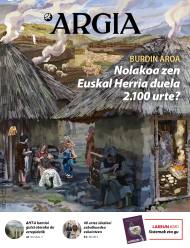



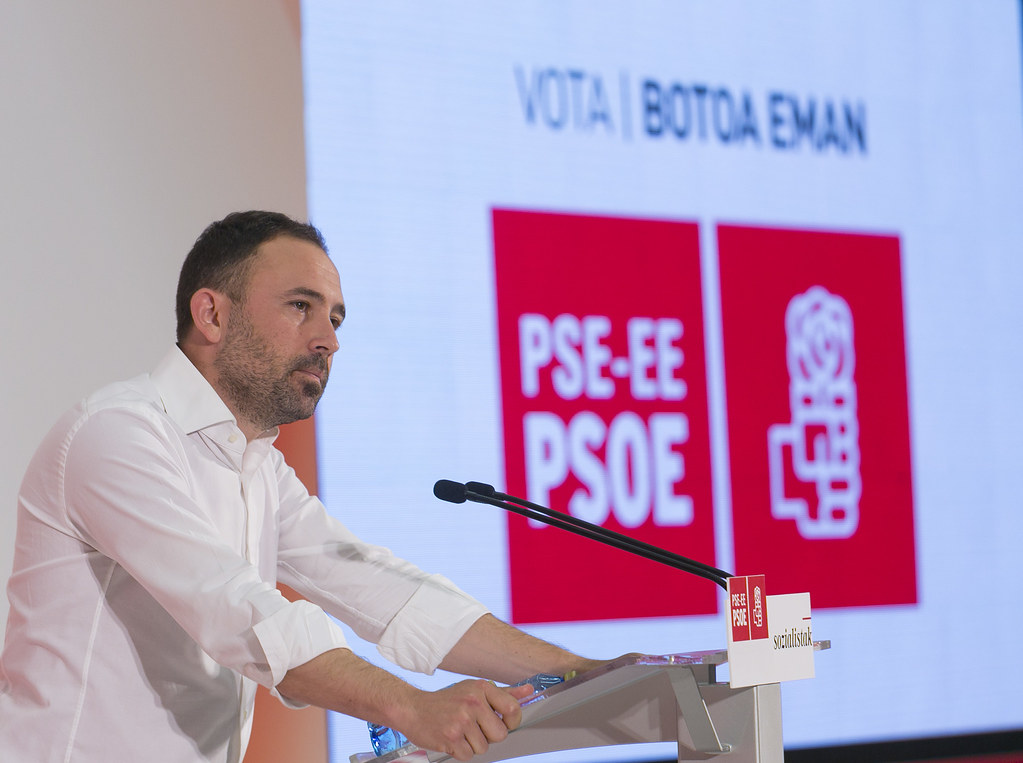
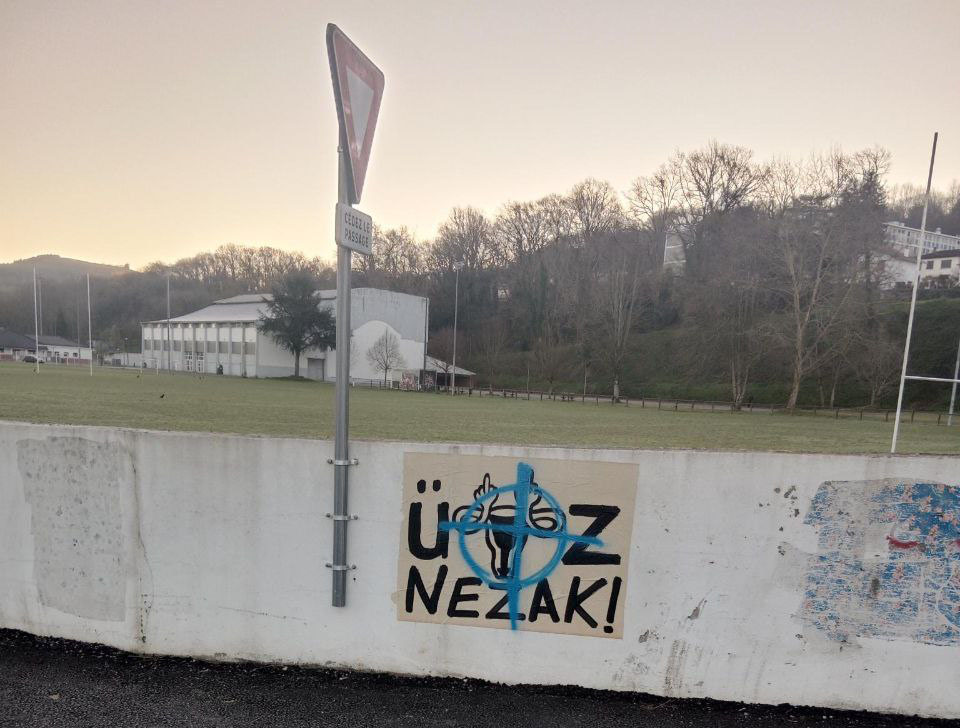
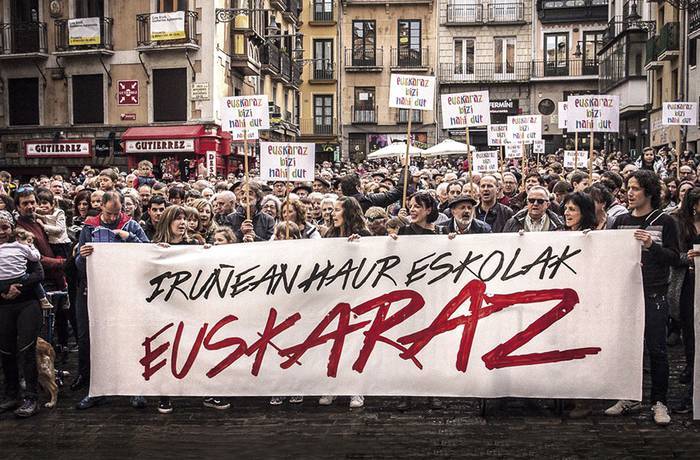

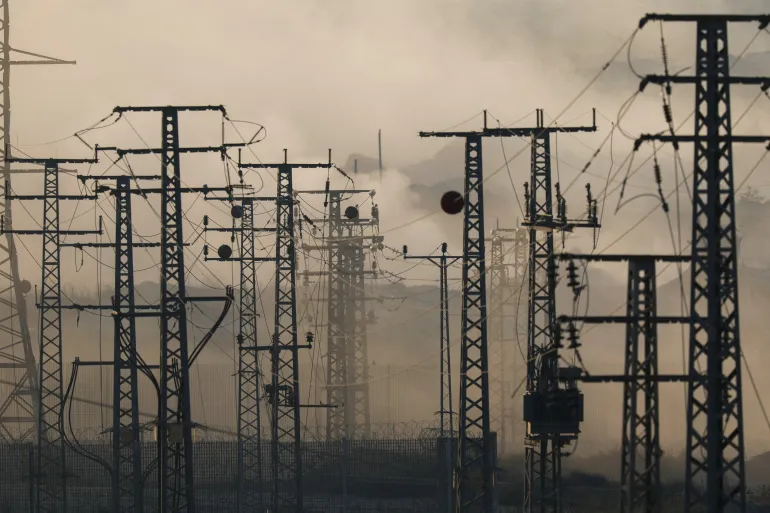
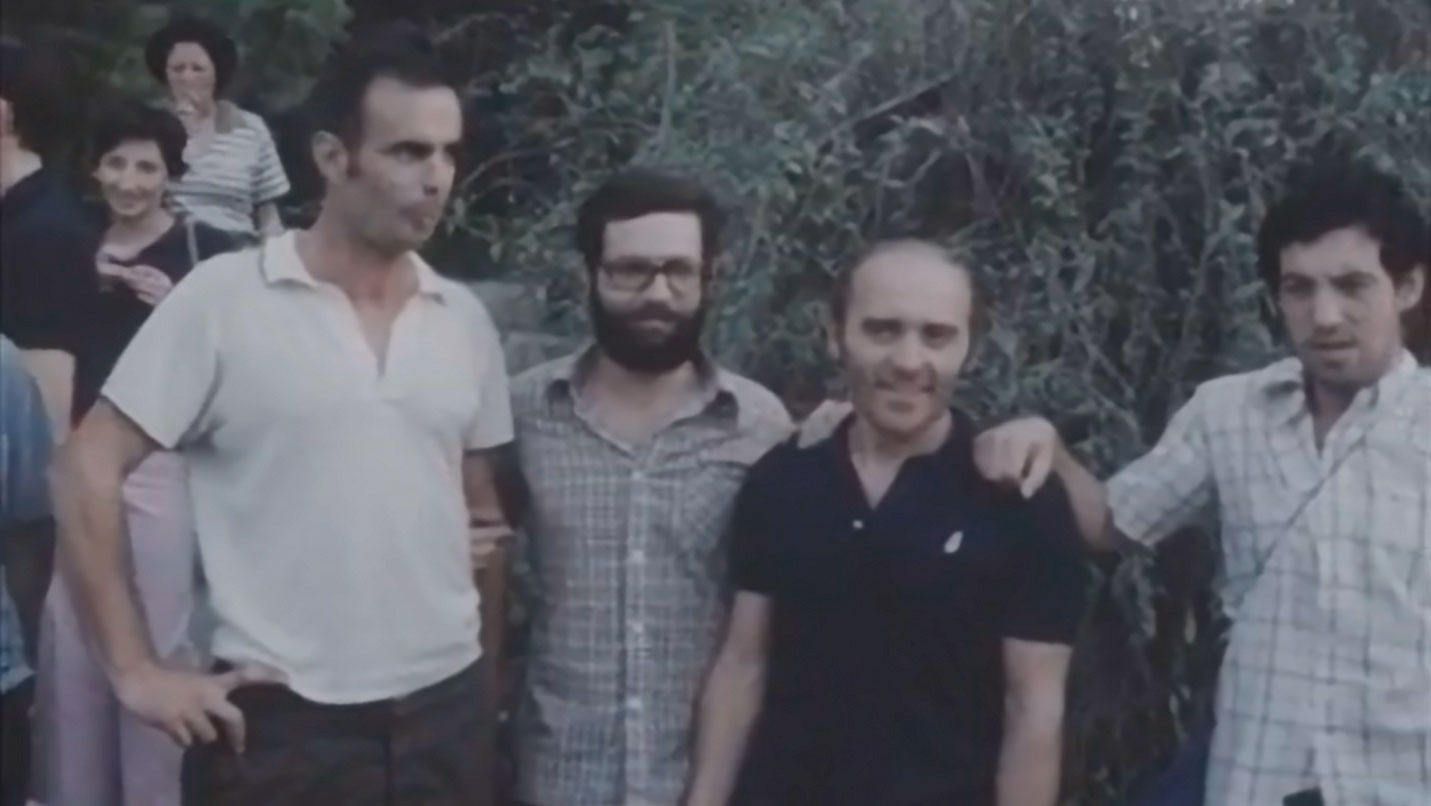
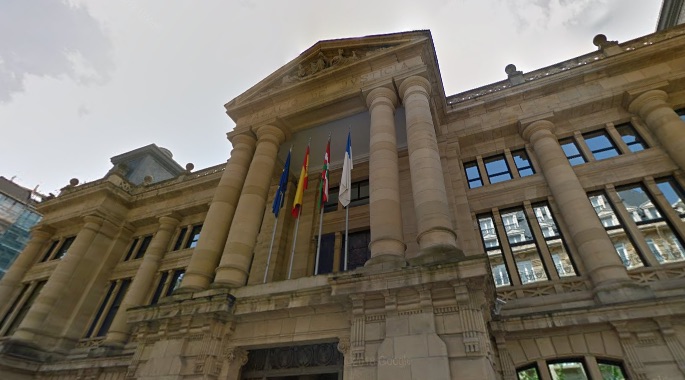
.jpg)